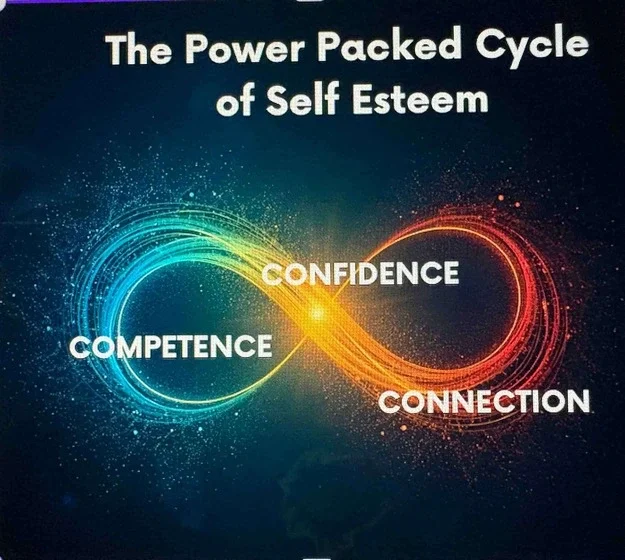The 3 C’s of Self-Esteem and How Coaching Can Support You!
Self-esteem encompasses our sense of capability, trust in ourselves, and connection with others. A straightforward way to understand and enhance self-esteem is through the three C’s, Competence, Confidence, and Connection. These elements are interconnected, creating a cycle that supports growth and resilience.
In this blog, I give an overview of each C, everyday obstacles, quick tips, and practical advice on how coaching can accelerate your progress.
Competence
Let's begin with competence! This relates to your confidence in performing tasks, based on your skills, knowledge, and dependability. When you feel competent, you trust your ability to learn, make decisions, and complete actions. This area of self-esteem grows through concrete successes like completing projects, acquiring new skills, or solving problems, all of which strengthen your belief in managing future difficulties.
Doubts about competence often stem from fear of being perceived as inexperienced, from avoiding challenges to prevent failure, or from lacking a clear learning plan. The good news is that competence develops naturally through small, focused steps. Break skills into micro-tasks, set short practice sessions, and track your progress. Regular reflection on your achievements and learnings turns incremental efforts into visible growth.
Coaching can support this process by helping identify skill gaps, creating practical practice routines, providing feedback, maintaining accountability, and transforming setbacks into learning opportunities. Targeted exercises and consistent momentum make developing competence more enjoyable and effective.
Confidence
Confidence involves trusting your ability to handle situations. It's the inner voice saying, “I can do this.” While gaining skills boosts confidence, it's also shaped by how we interpret our experiences and self-talk. Negative self-criticism, catastrophic thinking, or seeking approval can undermine your confidence. Conversely, routines that affirm your reliability help build it.
Building confidence can be achieved through simple steps: listing past successes, reframing negative thoughts, gradually facing fears, and using calming rituals like focused breathing or positive affirmations before challenges. Over time, these habits create a track record of resilience and the ability to cope in uncertain situations.
A coach can enhance this development by sharing psychological tools inspired by cognitive-behavioural strategies and designing step-by-step plans to gently expand comfort zones without overwhelming you. They also serve as a dependable presence to support you when your inner critic is loud.
Connection
Connection focuses on feeling seen, accepted, and valued. It's crucial for self-esteem and involves the relationships outside ourselves. These include family, friendships, work connections, and our relationship with ourselves. Strong connections reduce shame, facilitate feedback, and create a sense of safety for taking risks.
Sometimes, individuals unintentionally weaken their relationships by withdrawing out of anxiety, obsessing over perfection, or relaxing boundaries excessively, which can cause hurt. Rebuilding a connection begins with small steps: sharing honest truths, listening carefully, or requesting help directly. Improving boundaries and practicing self-compassion further support healthier relationships.
Coaching provides a supportive environment to explore vulnerability, practice new communication skills, and receive honest, kind feedback. Over time, this fosters comfort with being seen and heard, skills that naturally transfer into other areas of life.
The 3 C’s of Competence, Confidence, and Connection form a wonderfully interconnected cycle. When you develop your skills, it naturally boosts your confidence, making you feel more comfortable taking social risks and forming stronger relationships. Those positive connections, in turn, offer helpful feedback and new opportunities for growth, which can boost your self-esteem even further. Of course, if one area faces challenges, it can impact the other C’s and the overall cycle.
Coaching plays a wonderful role in supporting this cycle by helping you practice skills, gently challenging negative self-talk, and guiding you through relational strategies with real-time feedback, thus keeping everything in harmony and supporting your overall growth.
In summary, self-esteem isn't a fixed trait but a blend of skills comprising competence, confidence, and connection, all of which you can intentionally develop. A coach helps you set clear, measurable goals and a straightforward plan to progress between sessions. With the right balance of challenge and support, taking small, consistent steps in each area, and seeking coaching when needed, you can change how you see yourself and relate to others. This isn't just about feeling better; it’s about becoming more effective, resilient, and present as you create the life you want.
If you feel that you lack self-esteem, I’d love to help you craft a practical 30-day starter plan that covers each of these essential areas.

